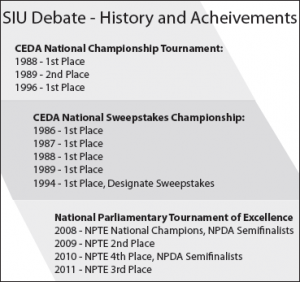Debate team makes national history

September 23, 2012
The Southern Illinois Debating Dawgs did something last weekend that no collegiate debate team has ever done in National Preliminary Tournament of Excellence history.
The team qualified for NPTE nationals — a top national competition for collegiate debate teams — after just one tournament and walked away with a perfect 20-0 record.
Mike Selck, a senior from Blue Springs, Mo., studying speech communication, and Josh Rivera, a sophomore from Chicago studying political science, won all of the tournament’s 20 debates, which exceeded the 18-win qualification to attend the national competition, all in the season’s first tournament.
Advertisement
“It’s a program that a lot of universities don’t compete in, and they not only compete but these young people are national stars,” SIU President Glenn Poshard said. “I think they are one of the success stories of the university.”
NPTE rules were recently changed to require 18 wins to reach nationals. However, it was unforeseen that a team could win every debate in the first tournament.
“No one expected to qualify this early,” said Todd Graham, the team’s debate director. “It’s even possible to win both tournaments and still not qualify, but we went undefeated.”
Aside from the win, the Dawgs also came home with the Jewell Award, which is given to the tournament’s best overall team. This is Selck’s second year to receive the award.
“It seems like a good precedent to set for the beginning of the year to show people that we are committed this year and that I want this year to be a great year for debate and ultimately achieve whatever goals that is,” he said.
As the tournament’s smallest team and one of the smallest in the country with only four members, the Debating Dawgs placed fourth of 52 teams overall. Three of the four — Selck, Rivera and Ben Campbell, a junior from Springfield, Mo., studying political science — were named as the tournament’s top three speakers. They beat out more than 100 other competitors.
“Many schools will field a large number of teams, and they hope some are successful,” said Nathan Stucky, director of speech communications at SIU. “We’ve been fielding two teams which are very successful. The odds are quite remarkable.”
Advertisement*
The team attributes its wins and overall record to the amount of work it puts into tournament preparation. Practice is held twice a week and weekends for several hours.
However, Graham said the team’s biggest strength is its research.
“We always do things past the requirements that we have, and doing things like that are necessary because it helps us not only rid us of our egos, but realize that if we don’t get better, other teams will,” Selck said.
Debate topics covered include issues such as environmental, economical, foreign policies, military engagements and even how the Supreme Court should rule on certain bills. This requires the team to be up-to-date on events and well-researched on as many topics as possible.
Even with all the work and practices, Graham said there are more elements to the art of debate.
“We have to hope that we get topics that we know something about, but we still have to out-debate the other team,” he said. “Speaking and precision are important, but reasoning and logic trump those every time. Just like in any sport, to win you have to debate well and you have to get lucky.”
Selck also attributes the team’s success to combined efforts from every debater, Graham and Kyle Cheesewright and Steve Farias, the team’s graduate assistants who attend every debate and help the team build arguments even on the road.
“Having them there is a vital part to our improvement and really increases the scope of knowledge that every individual takes,” Selck said. “Todd is one of the best debate coaches I have ever had.”
Graham is in charge of recruiting the team’s every member, as well as managing any received scholarships. He said the recent budget cuts have played a role in his selection process. Graham said he starts with Illinois’ most experienced students and works his way to the neighboring states to select who receives the scholarships. Scholarship amounts are the same for every member. Although they are not a full-ride, Graham said they have to be enough to compete with other schools’ debate scholarships.
“I know that these are tough times with the budget situation,” Graham said. “We’ve learned how to be as effective as possible with four team members, and we know the odds are against us, but that’s why we work twice as hard.”
Selck admits that being a small team can be intimidating and frightening at times. However, he said it has its benefits and can be very rewarding considering the long history and tradition of positive outcomes of the university’s debate teams.
“I love the amount of visibility that we get from the university and that they do everything possible to help us,” Selck said. “It reflects that even with budget cuts, the debate team is still going to try to be one of the most exceptional teams there are.”
Advertisement







